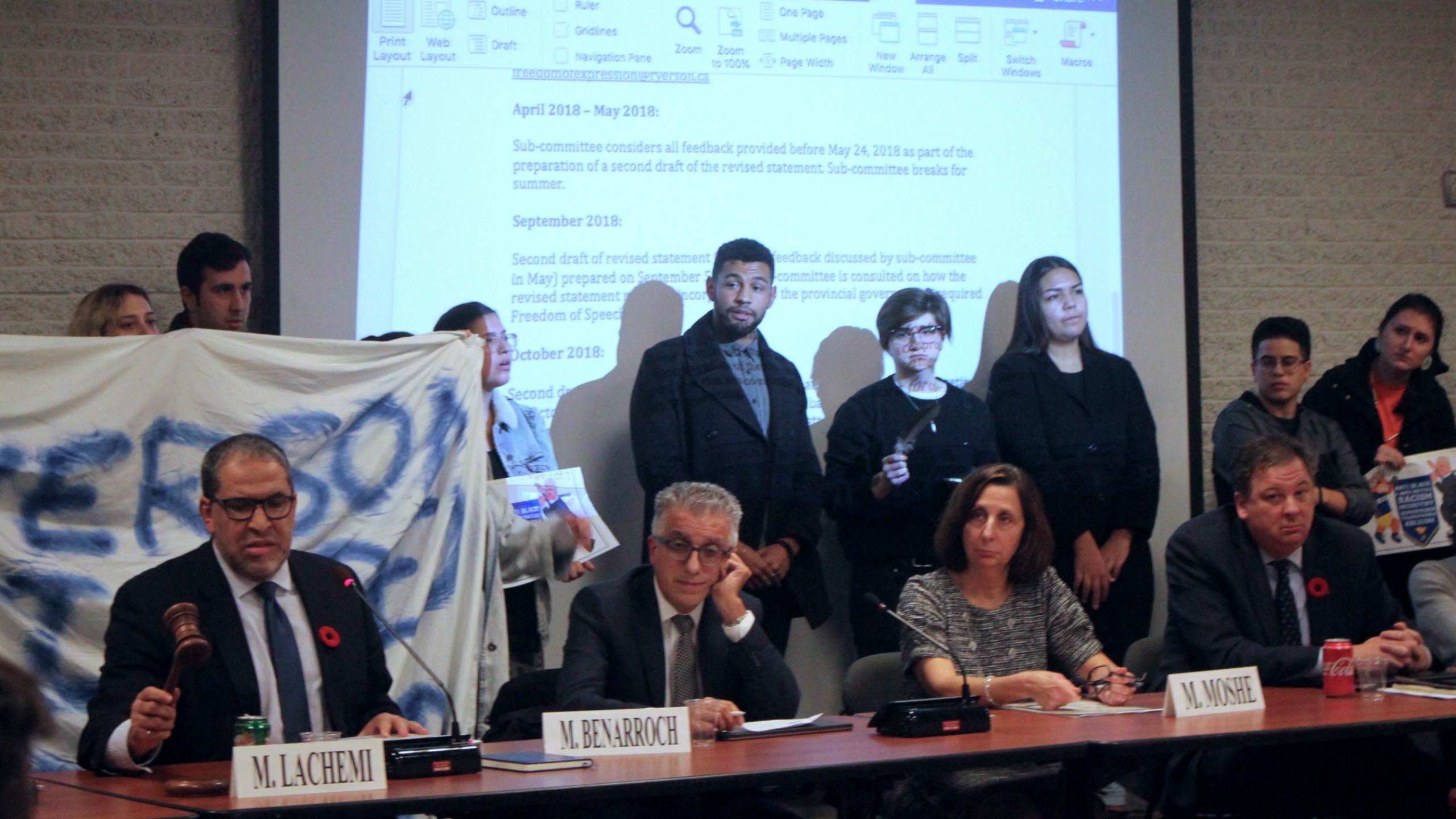By Maggie Macintosh
Ryerson University’s plan to adopt a new statement on free expression has been put on hold.
The Senate will no longer vote on the proposed draft statement in its current form, according to Ryerson president Mohamed Lachemi.
The announcement follows a student protest during a meeting on Nov. 6, in which the Senate was expected to vote on the statement. Lachemi adjourned the meeting with no vote amid a heated debate about free speech between student activists and members of Senate.
“The need for further consultation with our entire community on the statement is apparent,” Lachemi said, one week after the protest.
Members of the Black Liberation Collective (BLC) and Indigenous Students Rising (ISR) at Ryerson interrupted the Senate meeting. The activists chanted, “Whose campus? Our campus!” as they carried bed sheets that displayed the words, “Ryerson is in bed with Ford” into the meeting.
BLC co-founder Josh Lamers demanded Lachemi, chair of the Senate, and all members of Senate scrap the university’s statement altogether and take a united stance against Ontario premier Doug Ford.
The Ford government announced in August all publicly-funded universities had to create a policy on free expression in line with the government’s criteria before January 2019. The institutions that don’t comply, the province warned, could face operational funding cuts.
When the announcement was made, Ryerson administration was already in the process of updating the university’s statement on free speech.
The Senate started reviewing Ryerson’s current statement, which has been in place since 2010, back in June 2017. (Before adjourning the Senate mid-meeting on Nov. 6, Lachemi reiterated to attendees several times that Ryerson was trying to adopt a new statement, not a policy like the province has outlined.)
“This moment of celebration is not a distraction for us,” Lamers said in a statement to The Eye. “We want meaningful and genuine consultations about how to move forward, and these need to be public spaces rather than behind-the-scenes conversations.”
Lamers said BLC and other activists on campus held university administration accountable to students who are Black, Indigenous, part of the LGBTQ community, women and students who have disabilities during their protest. However, he said the fact Lachemi hasn’t directly contacted BLC to let the group know about the university’s latest decision “causes us pain and caution because it’s clear they still don’t see themselves as accountable to us, the very students who got us to this moment.”
At the Senate meeting, Lamers and others, including ISR representative Olson Crow, talked about their concerns about the university’s lack of support for marginalized students.
“When we’re talking about free speech here, it sure looks like free speech for fascists, neo-Nazis, Holocaust deniers, free speech for settlers and white folks. What I don’t see is free speech for Black students, Indigenous students,” Crow told the Senate.
The draft statement reads that the university supports the expression of perspectives ranging from those deemed difficult to controversial, extreme to “wrong-headed.” The draft also states, “the university may reasonably regulate the time, place, and manner of expression to ensure that it does not disrupt the normal activities of the university.”
Socialist Fightback at Ryerson, who was also in attendance at the Nov. 6 Senate meeting, has previously called the draft statement a part of Ford’s “anti-protest law.”
Karolina Surowiec, vice-president equity at the Ryerson Students’ Union (RSU), said in a statement to The Eye she and the RSU equity and campaigns organizer have discussed the draft and “believe it needs to be improved and changed.”
Surowiec did not elaborate on their specific concerns.
Lachemi said he’s asked provost Michael Benarroch and others to begin a series of discussions to explore their next steps.
Benarroch said they want to hold both meetings with student groups and town halls. Nothing has been scheduled yet.
“We’re not going to force the process,” he said. “We’re going to try to make sure that everybody feels that they’ve had an opportunity to have some input.”
When asked if the university would consider scrapping the new draft statement altogether, Benarroch said the current statement is good. “For now, we’re going to stick with it. We’ll see what happens.”










Leave a Reply